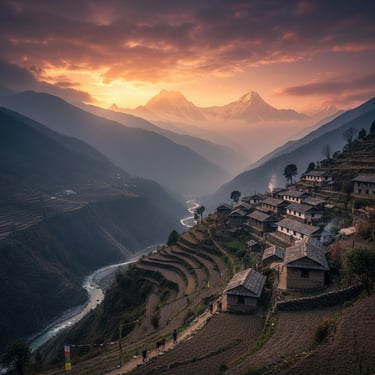The Mad Honey Diaries (Pt.1)
A Westerner's Quest for the Red Gold of the Himalayas
Jessie Cavendale
11/2/20253 min read


The Siren's Call and the Journey to the Edge of the Map
They say every great obsession begins with a whisper. Mine began with a story told over a crackling fire in a dusty Arizona desert, a world away from where I sit now, listening to the monsoon rain drum a rhythm on a tin roof in the foothills of the Himalayas.
An old anthropologist, his skin like worn leather and eyes full of ancient skies, spoke of a honey unlike any other. He called it mad honey. He described it as a deep, reddish-gold, harvested from cliffs that scraped the sky in the mist-shrouded mountains of Nepal. But its color wasn't its secret. Its power, he claimed, came from the rhododendron flowers the giant Himalayan bees foraged from—flowers that contained a natural, psychoactive compound called grayanotoxin.
A spoonful, he said, wasn't just a taste. It was a journey. A warm, euphoric lightness, a tingling in the limbs, a subtle shift in perception that the Gurung and Magar peoples of Nepal had used for centuries in their rituals and medicine. It was, in his words, "the echo of the mountain's own voice, bottled."
That was it. The hook was set. The idea of a true, authentic, culturally significant mad honey—not the diluted, commercial stuff—became my personal white whale. Or rather, my red gold.
The search for a way in was a digital odyssey through shaky satellite internet and cryptic forum posts. Emails bounced back. Inquiries were met with silence. The trail was cold until I stumbled upon a single, grainy photo on a trekker's blog, buried in the comments: a man with a kind but fiercely proud face, standing before a sheer cliff face dotted with long, traditional rope ladders. The caption simply read: "Kamal. Jogipada. He knows the bees."
Jogipada. The name didn't appear on any tourist map. It was a speck, a gateway village for the elusive honey hunters. After weeks of patient effort, I made contact through a chain of translators and a borrowed satellite phone. Kamal’s response, when it finally came, was as rugged and direct as the mountains he called home. "You come to understand, not just to take? Then come. The great harvest for Mahadev is soon. We will see if the mountains accept you."
Getting here was a lesson in shedding the West. A long flight to Kathmandu—a city that assaults the senses in the best way possible, a chaotic symphony of smells, sounds, and colors. Then a smaller, terrifyingly beautiful flight to Pokhara, where the Annapurna range suddenly rears up like a frozen white tsunami against the blue sky. That's when you feel it. The scale. The insignificance.
From Pokhara, the real journey began. A jeep ride that rattled every bone in my body, climbing narrow, crumbling roads etched into the sides of vertiginous green valleys. We forded rivers where bridges had been washed away, the water swirling at the doorframes. My fellow passengers—subsistence farmers, mothers with children, an old man clutching a live chicken—seemed utterly unfazed. I was the only one gripping the seat, my knuckles white.
After eight hours, the jeep could go no further. I shouldered my pack and began the final leg on foot, following a narrow stone path that wound upwards through terraced fields of millet and rice. The air grew cooler, thinner, and filled with the scent of damp earth and blooming flowers I couldn't name.
And now, I am here. Jogipada.
It’s not a town; it’s a collection of perhaps two dozen stone and wood houses clinging to a steep hillside. There are no roads, only flagstone paths. No power lines, only the occasional solar panel. The night is profoundly, beautifully dark, punctuated by the glow of cooking fires and the distant bark of a dog.
I met Kamal briefly at his home. He is a man of few words, his eyes holding a deep, weathered calm. He assessed me, my boots, my spirit, with a single, sweeping glance.
"We rest," he said, his voice a low rumble. "At first light, we go to the cliffs. The bees are waiting. And the honey... the honey is ready." He handed me a small, rough clay cup of sweet, milky tea. "Sleep well. Tomorrow, you walk with the hunters."
As I sit here in the simple lodge, the immensity of what I'm about to witness settles upon me. This isn't a tour. It's an invitation into a sacred, dangerous tradition. I came in search of a substance, but I have a feeling I will find something far more profound.
The mountains are silent out there in the darkness, but their call is louder than ever. Tomorrow, I answer it.
